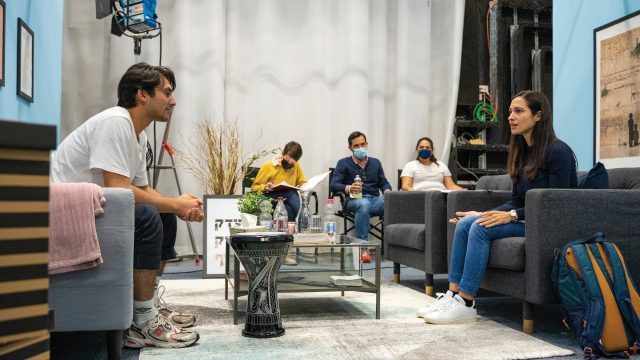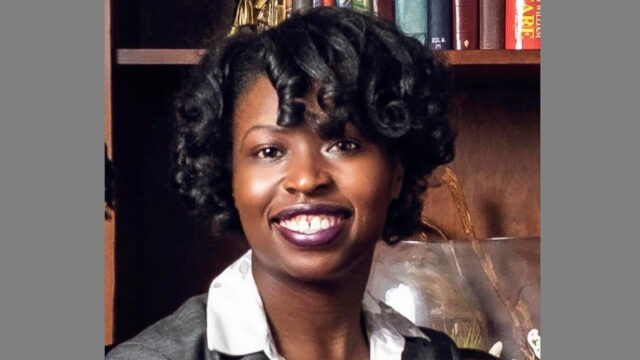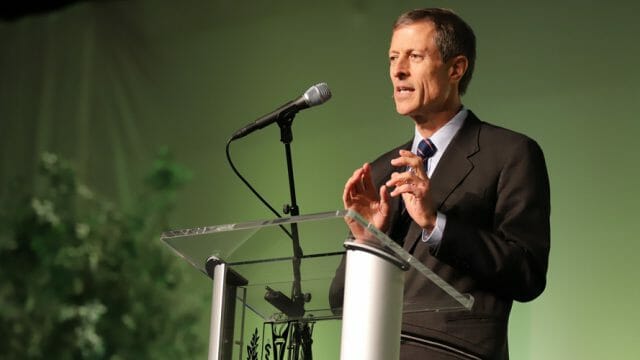Enthusiastic volunteers huddled in “The STEM Experience” in the exhibit hall of the North American Division’s 2023 Educators’ Convention. Sponsored by the Versacare Foundation, the […]

Enthusiastic volunteers huddled in “The STEM Experience” in the exhibit hall of the North American Division’s 2023 Educators’ Convention. Sponsored by the Versacare Foundation, the initiative aimed to spark excitement among primary and secondary (K-12) educators for STEM (science, technology, engineering, and mathematics) education via hands-on activities, demonstrations, and workshops.
It also intended to demonstrate what students can achieve through innovation and design thinking.
The exhibit comprised three segments: (1) an information section featuring secondary and post-secondary STEM programs; (2) a “tinker space,” where elementary educators could learn about and play with STEM toys; and (3) a high school area that included demonstrations and hands-on activities. Notably, on August 9, the final day of the exhibits, participants could take home STEM games on display through a giveaway.
Brenden Henley, a sophomore Oakwood University biomedical engineering major, was spotlighted among the volunteers that first day. He had accompanied his father, Robert Henley, director of the Florida Conference Institute for Leadership and Innovation (FCILI), to share how early exposure to STEM helped him discover his calling. The humble young man prayed for the group, then, after some prompting, told his story before the crowds arrived.
“This summer, I was at GE Healthcare working on software for the MRI [magnetic resonance imaging] patients,” student Henley said, to claps and cheers. He continued, “I put the experience I had [at FCILI] on my resume.” At the engineering expo where he was hired, he had brought with him a stroke rehab device he’d created in high school and turned into a business; the device uses tactile signals to remind patients to stand up straight. “Once they saw that I’d used Arduino [coding software], they hired me right away.”
Science-Based Show-and-Tell
The STEM Experience could best be described as a science-based show-and-tell. On the elementary side, in the “tinker space,” educators tried out various STEM toys. For instance, they could program the movement of ozobots, or mini robots, across a mat using color coding markers or simple software; build circuits following step-by-step written instructions; or create masterpieces with magnetic building blocks.

Visitors also learned how to integrate science into different subjects, such as programming an ozobot to “travel” across a map. “I’m a humanities teacher but believe in STEM across the curriculum. I’ve gone to schools and worked with teachers who have used it for math, science, social studies, Bible, everything,” said elementary organizer Betty Nugent, FCILI innovation, STEM, and project-based learning trainer and coach.
High school demonstrations included virtual reality using Unity software; robotics coding via VEXcode; information on EXSEED, Loma Linda University’s STEM leadership certificate program for K-12 educators; the MakerBot Sketch 3D Printer; TinkerCad, a design, electronics, and coding software; the brain-computer interface — that is to say, using software to control objects with your brain; and information on STEM courses at Adventist universities in the United States, including Walla Walla, Oakwood, and Andrews, among others.
Fostering Empathy and Leadership through Innovation
An awe-inspiring high school project on display was a student-designed solar car, which goes 40 miles per hour (64 kmh) and will be the only Adventist offering in a national high school competition next summer. Ronnie Pittman, chair of the innovation department for the North Tampa Christian Academy, asserted that his only contribution to the car project was teaching the students welding. “It’s 100 percent student-built. All the designing, cutting, welding, CAD [computer-aided design] … that’s all them.”
The project also illustrated tenets of design thinking, a human-centered mindset leading to innovation. For instance, Pittman’s students learned welding through community service; specifically, they converted a trailer to feed the homeless for an organization called SALT in Orlando, Florida. Design thinking asks, “What problem needs to be solved?” Once the problem is identified through surveys, the following steps are brainstorming, creating solutions, testing and assessing prototypes, and refining the design.
Visitors also learned about the exhibit’s principal partner, the Florida Conference Institute for Leadership and Innovation (FCILI). This unique center combines computing, industrial design, social innovation/invention, and entrepreneurship, founded upon design thinking. Here, K-12 students experience self-driven, project-based learning. Robert Henley explained, “Innovation empowers students to think of themselves as experts capable of harnessing their creativity and using their knowledge and skills to develop mastery and solve real problems in a multi-year context.”
The heart of the center is found in Jeremiah 1:5, paraphrased by Henley as, “Before I formed you in the womb, I knew you. Before you were born, I set you apart. I appointed you to be a leader to the nations.” Accordingly, it aims to level the playing field for groups not typically engaged in STEM, such as women and minorities. For all students, FCILI’s real-world experience opens doors to “career opportunities they’d never dream of.”
Courtney Brown, middle school math/science teacher and STEM director at Takoma Academy Preparatory School and “STEM Experience” participant, stated, “I was fascinated to see the students working with Robert [Henley] on coding and robotics projects. STEM [provides] a platform for collaboration, problem-solving, and critical thinking. I’m excited to adopt innovation and design thinking to elevate the learning experience at my school.”
Brown and others affirmed Nugent’s wish for the exhibit. “Brenden has quite a story,” Nugent told her volunteers in the pre-event huddle. “We’re trying to make more of those stories. That’s what we need. That’s why we’re here.”
The original version of this story was posted on the North-American Division news site.








